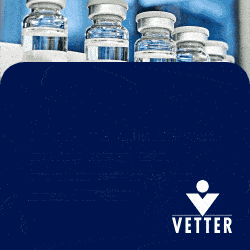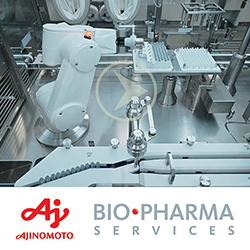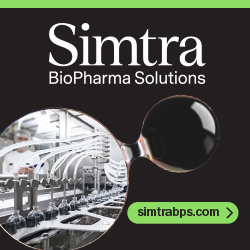7/12/2011
Evotec & Roche to Jointly Develop Biomarkers in Oncology
Evotec AG and Roche recently announced a collaboration in novel protein activity based biomarkers for Roche’s oncology drugs under development. Evotec AG will employ its PhosphoScout platform to discover protein-phosphorylation’s that predict favorable dosage and efficacy of targeted cancer drugs in patients. Roche will be responsible for conducting clinical trials as well as assessing the development of companion diagnostics for patient stratification.
“We are very pleased to collaborate with Evotec AG and benefit from the
PhosphoScout technology to identify appropriate pharmacodynamics and patient stratification biomarkers,” said Mike Burgess, Global Head of Oncology, Roche Pharma Research and Exploratory Development. “These biomarkers are core to the development of targeted therapeutics for cancer therapy.”
“Biomarker-based personalized healthcare has led to a paradigm shift in cancer therapy,” added Dr. Werner Lanthaler, Chief Executive Officer of Evotec AG. “We are proud to partner Evotec’s novel biomarker concept with Roche, the world-leading personalized healthcare company, and its Pharma Research and Development Organization.”
Under the initial 3-year term, Evotec and Roche will conduct multiple biomarker programs for therapeutic antibodies or small molecule inhibitors. Evotec will receive undisclosed up-front and success-based payments for each program.
Evotec’s PhosphoScout platform employs high-end mass spectrometry to identify and quantify thousands of cellular phosphorylation events on a global scale. Unlike immunoassays, PhosphoScout allows truly unbiased systems-wide profiling of signaling pathways. Monitoring changes in the cellular phosphoproteome in response to drug treatment not only supports mechanistic understanding of targeted drugs but also enables the discovery of predictive biomarkers.
Evotec is a drug discovery alliance and development partnership company focused on rapidly progressing innovative product approaches with leading pharmaceutical and biotechnology companies. It operates worldwide providing the highest quality stand-alone and integrated drug discovery solutions, covering all activities from target-to-clinic. Evotec has long-term discovery alliances with partners, including Boehringer Ingelheim, CHDI, Genentech, Medimmune/Astra Zeneca, Novartis, and Ono Pharmaceutical. In addition, Evotec has existing development partnerships and product candidates both in clinical and preclinical development.
Gateway Analytical Registers With
Gateway Analytical showed confidence in its quality system, a collection of policies, procedures, plans, and supporting infrastructure documenting control over all activities, for pharmaceutical analysis with its recent registration with the US FDA. As a laboratory conducting high-quality tests for drug manufacturing companies recognized by the FDA, Gateway Analytical took a necessary step by registering. All companies registered are eligible for full-facility inspections at any time.
“This registration with the FDA demonstrates our commitment to our quality system, which is the basis of all of our analytical testing services,” said David Exline, Senior Vice President of Gateway Analytical. “Our goal is to take the same approach with regulatory entities in other industries that we serve.”
Gateway Analytical complies with current good manufacturing (cGMP) standards and is currently implementing procedures conforming to guidelines compliant with 21 CFR Parts 210 & 211, ISO/IEC 17025:2005, ISO 9001:2008 and ASCLD/LAB-2006 Supplemental Requirements. The analytical lab specializes in pharmaceutical and industrial forensics, particle identification and characterization, and criminal trace evidence examination services.
Infinity Expands Development Program for Oral Smoothened Antagonist Targeting Hedgehog Pathway
Infinity Pharmaceuticals, Inc. recently announced it is expanding its clinical development program for IPI-926, a novel, oral small molecule that inhibits Smoothened, a key component of the Hedgehog pathway. As part of this expansion, Infinity plans to initiate an exploratory Phase II clinical trial in patients with myelofibrosis, an incurable malignancy of the bone marrow characterized by the replacement of normal bone marrow by fibrotic tissue and the production of blood cells in other organs, such as the spleen and liver.
The single-arm, Phase II trial is designed to evaluate the safety and efficacy of IPI-926 administered orally once daily in up to 45 patients with myelofibrosis. The primary endpoint of the trial is hematologic response rate. The trial is expected to begin in the third quarter of 2011.
“The important role of the Hedgehog pathway in pathogenic fibrosis leads us to believe that IPI-926 may have application across a range of malignancies, including pancreatic cancer and myelofibrosis, in which malignant cells create a dense, fibrotic, protective microenvironment via the Hedgehog pathway signaling to the stroma,” said Pedro Santabarbara, MD, PhD, Chief Medical Officer at Infinity. “While other agents in development for the treatment of myelofibrosis reduce spleen size, there is still a significant need for novel treatment options that can directly target the malignant fibrosis underlying this disease.”
Infinity scientists and their academic collaborators have led the way in validating the role of Hedgehog pathway signaling in the tumor-stroma interaction in pancreatic cancer. Earlier this month, Infinity presented encouraging Phase Ib results for IPI-926 in combination with gemcitabine in patients with metastatic pancreatic cancer. Data from the study showed that IPI-926 was well tolerated and clinically active. Partial responses were observed in five out of 16 patients, for a 31% response rate. Infinity continues to explore other potential indications for IPI-926 and plans to initiate multiple investigator-sponsored trials this year.
Myelofibrosis, an incurable malignancy of the bone marrow, is characterized by the replacement of normal bone marrow by fibrotic tissue and the production of blood cells in other organs, such as the spleen and liver. The primary manifestations of myelofibrosis are severe anemia resulting in weakness and fatigue, as well as massive enlargement of the spleen (splenomegaly) and liver (hepatomegaly), which result in abdominal pain and ultimately liver failure. The 5-year survival rate for myelofibrosis is approximately 40%.
There are limited treatment options for patients with myelofibrosis, and there are no approved therapeutic agents that directly target the fibrosis that underlies this disease.
Malignant activation of the Hedgehog pathway is responsible for a broad range of cancers. IPI-926 targets the Hedgehog pathway by inhibiting Smoothened (Smo), a key signaling component of the Hedgehog pathway. Smo inhibition represents a significant anticancer opportunity for addressing a number of difficult-to-treat cancers by disrupting malignant activation of the pathway.
IPI-926 is currently being evaluated in multiple trials, including a Phase II trial in combination with gemcitabine in previously untreated patients with metastatic pancreatic cancer and a Phase II study as a single agent in patients with chondrosarcoma. A Phase II trial of IPI-926 as a single agent in patients with myelofibrosis is planned to begin in the third quarter of 2011. IPI-926 was well-tolerated and showed clinical activity in a Phase Ib trial in patients with metastatic pancreatic cancer and in a Phase I trial in patients with advanced solid tumors, including a cohort of patients with basal cell carcinoma. These clinical trials build upon a robust set of supporting data that provide a strong rationale for evaluating the potential of IPI-926 for treatment across a broad range of cancers.
Unique Gel Capsule Structure Enables Co-Delivery of Different Types of Drugs
Researchers at the Georgia Institute of Technology have designed a multiple-compartment gel capsule that could be used to simultaneously deliver drugs of different types. The researchers used a simple one-pot method to prepare the hydrogel capsules, which measure less than 1 micron.
The capsule’s structure (hollow except for polymer chains tethered to the interior of the shell) provides spatially segregated compartments that make it a good candidate for multi-drug encapsulation and release strategies. The microcapsule could be used to simultaneously deliver distinct drugs by filling the core of the capsule with hydrophilic drugs and trapping hydrophobic drugs within nanoparticles assembled from the polymer chains.
“We have demonstrated we can make a fairly complex multi-component delivery vehicle using a relatively straightforward and scalable synthesis,” said L. Andrew Lyon, a Professor in the
Mr. Lyon and Xiaobo Hu, a former visiting scholar at Georgia Tech, created the microcapsules. As a graduate student at the Research Institute of Materials Science at the South China University of Technology, Mr. Hu is co-advised by Mr. Lyon and Zhen Tong of the South China University of Technology. Funding for this research was provided to Mr. Hu by the China Scholarship Council.
The researchers began the two-step, one-pot synthesis procedure by forming core particles from a temperature-sensitive polymer called poly(N-isopropylacrylamide). To create a dissolvable core, they formed polymer chains from the particles without a cross-linking agent. This resulted in an aggregated collection of polymer chains with temperature-dependent stability.
“The polymer comprising the core particles is known for undergoing chain transfer reactions that add cross-linking points without the presence of a cross-linking agent, so we initiated the polymerization using a redox method with ammonium persulfate and N,N,N’,N’-tetramethylethylenediamine. This ensured those side chain transfer reactions did not occur, which allowed us to create a truly dissolvable core,” explained Mr. Lyon.
For the second step in the procedure, Mr. Lyon and Mr. Hu added a cross-linking agent to a polymer called poly(N-isopropylmethacrylamide) to create a shell around the aggregated polymer chains. The researchers conducted this step under conditions that would allow any core-associated polymer chains that interacted with the shell during synthesis to undergo chain transfer and become grafted to the interior of the shell.
Cooling the microcapsule exploited the temperature-sensitivities of the polymers. The shell swelled with water and expanded to its stable size, while the free-floating polymer chains in the center of the capsule diffused out of the core, leaving behind an empty space. Any chains that stuck to the shell during its synthesis remained. Because the chains control the interaction between the particles they store and their surroundings, the tethered chains can act as hydrophobic drug carriers.
Compared to delivering a single drug, co-delivery of multiple drugs has several potential advantages, including synergistic effects, suppressed drug resistance, and the ability to tune the relative dosage of various drugs. The future optimization of these microcapsules may allow simultaneous delivery of distinct classes of drugs for the treatment of diseases like cancer, which is often treated using combination chemotherapy.
ResearchDx & CompanDX Announce Strategic Partnership
ResearchDx, LLC recently announced a strategic partnership with CompanDX to offer a full capability to discover and deliver novel molecular diagnostic tests for clients in the healthcare setting. CompanDX uses its unique Distiller platform to deliver small composite biomarker signatures from complex data of high dimensionality, which are commonplace in clinical development of therapeutics. ResearchDx draws on its broad capability to design, produce, and validate tests ready for the market and represents a new breed of service provider, the first CDO to offer turnkey solutions for companion diagnostic delivery.
“Our partnership with CompanDX completes our service offerings,” said Founders of ResearchDx, Dr. Philip Cotter and Dr. Mathew Moore. “CompanDX’s unique capabilities allow us to fully integrate bioinformatics into development of a diagnostic product from early in the discovery process. Our customers can trust ResearchDx to meet scientific challenges with a focus on their business priorities.”
The new partnership will allow clients to initiate the parallel development of companion diagnostic tests from the very earliest stages of drug development. CompanDX has developed a set of industry-leading tools to deliver definitive understanding of mechanism of action and biomarkers that describe patient response.
“ResearchDx occupies a space in the development of companion diagnostics that is highly complementary with our discovery platform,” explained Andy Sutton, CEO of CompanDX. “Both companies strive to provide innovative solutions, cutting-edge capabilities, and outcome focused delivery. We are thrilled to dovetail into ResearchDx’s downstream delivery by providing the biomarkers tailored to client’s drug candidates that will form the basis of validated tests for use in the clinic.”
ResearchDx is a Contract Diagnostics Organization (CDO) for the biopharmaceutical and diagnostic industries. The company provides comprehensive, integrated, flexible services for the in vitro diagnostic development process. From initial assay conceptualization, discovery, optimization, and validation in a CAP/CLIA laboratory environment, through a complete set of clinical research services and on to regulatory approval, ResearchDx offers the services and solutions to meet complex diagnostics development needs. ResearchDx’s primary service areas include assay research and development, clinical laboratory services, clinical research, diagnostic manufacturing, and consulting.
CompanDX is a molecular diagnostics company focused on biomarker discovery that uses its unique Distiller platform to derive small composite biomarker panels defining patient populations of significant unmet need. Working with Pharma and biotech companies, CompanDX offers the opportunity to deliver stratified clinical trials utilizing companion diagnostic tests based on biomarkers derived from the Distiller bioinformatics platform.
Zogenix Enters $30-Million Royalty Financing Agreement
Zogenix, Inc., a pharmaceutical company commercializing and developing products for the treatment of central nervous system disorders and pain, recently announced it has entered into a $30-million royalty financing agreement with Cowen Healthcare Royalty Partners II, L.P. In addition, Cowen Royalty will make an equity investment of $1.5 million in Zogenix common stock and will receive warrants exercisable for 10 years into 225,000 shares of Zogenix common stock at an exercise price of $9.00 per share.
Under the terms of the structured royalty financing agreement, Cowen Royalty will invest $30 million in exchange for 5%, stepping down to 0.5%, of worldwide annual net sales of SUMAVEL DosePro, Zohydro (hydrocodone bitartrate) extended-release capsules (previously known as ZX002), and other products developed or marketed by Zogenix, co-promotion revenue and out-license revenues generated by Zogenix during the agreement term, subject to certain exclusions. Cowen Royalty will also receive fixed payments totaling $30 million, the last of which is payable in the first quarter of 2017, with the royalty obligation continuing through the first quarter of 2018.
Concurrent with this agreement, Zogenix amended its $25 million term loan with Oxford Finance Corporation and Silicon Valley Bank to defer principal repayment to February 1, 2012, eliminating $3.7 million of principal payments in 2011.
“We are very pleased to announce this royalty financing with Cowen Royalty,” said Roger Hawley, Chief Executive Officer of Zogenix. “We believe this financing structure provides us with minimally dilutive capital, which enables us to continue executing our operating plan. We are presently driving continued adoption of SUMAVEL DosePro, completing Phase III clinical development for Zohydro in anticipation of an NDA filing by early 2012, and leveraging our DosePro delivery platform for additional CNS products.”
“Zogenix is ideally positioned to address unmet needs in the CNS and pain markets with its currently promoted product, SUMAVEL DosePro, which addresses the multi-billion dollar migraine market, as well as its development pipeline,” added Todd C. Davis, Managing Director of Cowen Royalty. “Our investment with Zogenix fits our strategy of focusing on unique commercial stage products and companies with attractive risk/reward profiles.”
Zogenix, Inc., with offices in
Total Page Views: 1673

















